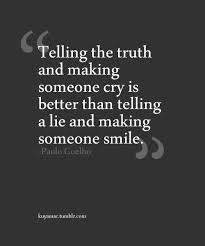"Dad, I was just listening to my son, who I adore more than I can say. He is one of the grandchildren you never got to meet.
As he told me the truth about an event with a ball and a window, I stopped listening to him and started preparing his punishment. But that didn’t feel right to me. So I have been doing some soul searching. I have just had a revelation—that by the time I was his age, I had long since stopped telling you the truth. Every time I told you the truth, you punished me, and you punished me hard and hurtfully.
Dad, I do not want my son to associate truth with punishment. I have to break the cycle set up by what you did to me. I have to forgive you for hurting me every time I told you the truth. I forgive you so I can be free to do things differently with my son. I forgive you so I can be totally free to tell the truth and live the truth and encourage my son to do the same.
I have to go now. I love you. Good-bye Dad."
* * *
Today is one month before the beginning of Lent. I am planning to go through another season of Lent with Peter Rollins and Friends in the "Atheism for Lent" course. Peter says he revamped the course, so I am looking forward to a new experience.
This whole blog started with my desire for authenticity. I wanted to be "real". Another word that I struggle with may also fit. I want to tell the "truth" about me. This week, I've been reading a book called "The Grief Recovery Handbook". One of the authors shared a story about his son and a baseball through a neighbour's window. His son opted to tell his dad the truth of what happened, instead of covering it up and lying about it. John admitted that part way through his son's confession, he stopped listening to his son and started planning a punishment for the broken window. He later remembered that his dad would punish him when he told the truth. The letter to his dad reveals a revelation to John that I am equally amazed at and doubt as a viable life lesson.
When does telling the truth ever give us a free pass from the consequences of our actions?
I have admired parents who in the moment of hearing their children's confessions, accept the truth as the end of the story. No punishment or further consequences are required after an honest confession is given. But is it at all preparing the child for the real world... where truth doesn't excuse the consequences?
Let's take my whole deconversion experience. There are moments that I feel punished for being honest. Those moments lead me to wonder if lying about my spiritual status would have been better; less heart breaking for others. For a social Enneagram 4, it is punishment when something I've done hurts someone else.
I started this blog last year to honestly process my thoughts in conjunction with the reading material I was getting in the "Atheism for Lent" course. But over the course of the year, I have shared my story and seen sadness in people's eyes, or imagined it, if I didn't see it. I have doubted myself and my actions. Maybe lying would have been more loving.
I don't know if I'm convinced yet. I have to say that for the most part, the people that are closest to me haven't abandoned me. (a big Enneagram 4 fear). I have been pretty blessed or lucky (however you want to describe it) to have amazing people in my life. But there have been a few that I feel like lying, not being forthright and honest, is preferable. Bursting their bubble seems cruel. Especially when their bubble is what keeps them breathing.
I've heard a lot of stories from people who have had it a lot worse than me. People lose families and friends and marriages break up.
This year, I want to see "Shame" take a back seat to "Integrity". I want to feel good about myself, just the way I am. I have shed some religious weight over the years and I am tired of feeling less about myself because of the fear of disappointing others.
I don't want to be punished for telling the truth, or being honest, or telling my story. I want to be valued for being me. Maybe it's a long shot. I live in a world filled with people who value certainty more than diversity. I look at others and see their foundations and what keeps them functioning in a very broken world. When I admit that I don't have the same foundations, what choices do they have?
1. Fear for my life, because I am not following the "narrow way" they subscribe to.
2. Fear that their foundation might be faulty, if I can live without it.
3. Abandon our relationship so they don't have to think of the first two options.
4. Wonder if maybe there is room for more than one way to navigate life
5. Embrace me and find some common ground
I started this blog post off with a quote from Mahatma Ghandi. He would be on my top ten list of inspirations of all time. He was all about finding common ground with others that didn't subscribe to his belief system. He was about finding the truth and being passionate about expressing his convictions. I admire people like that... but it cost him his life.
Truth is still a troubling subject for me. I don't like the word. It gets confused with opinion and interpretation. I will end this post with a quote that intrigues me. I don't know if it is "true"... but what if it was? How would that change things for me?






No comments:
Post a Comment